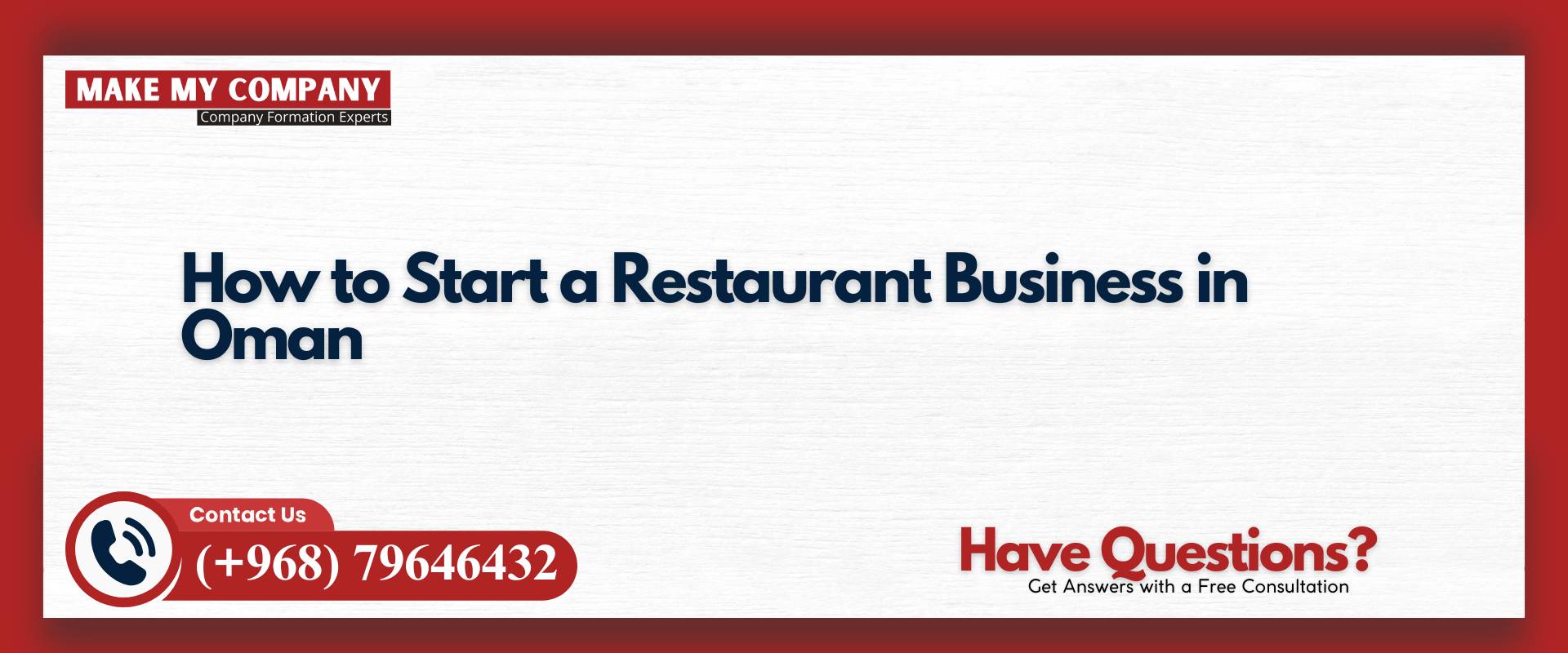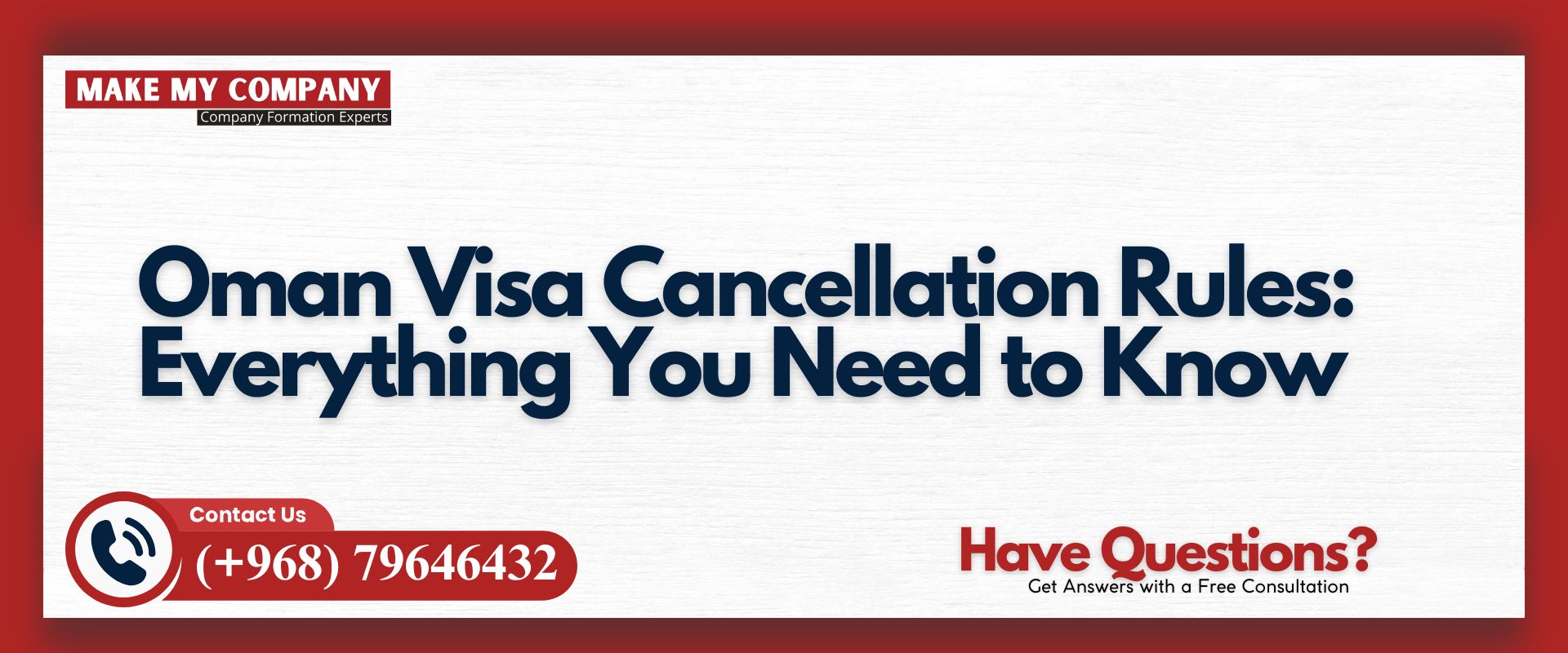Written by: Shuja Ahmad
Oman Restaurant & F&B Licensing Specialist
Last Updated: February, 2026
Based on MOCIIP, Ministry of Health, and Municipality current regulations
To start a restaurant business in Oman, you must register a company with Ministry of Commerce, Industry and Investment Promotion (MOCIIP), obtain municipality approval, secure a food safety license from the Ministry of Health, and get Royal Oman Police – Civil Defense clearance. Total setup cost typically ranges from OMR 20,000 to OMR 50,000 depending on location, size, and restaurant type.
This guide provides the complete licensing process, regulatory requirements, and cost breakdown for opening a restaurant in Oman in 2026.
Table of Contents
Restaurant License Requirements in Oman (Quick Checklist)
Mandatory Licenses & Approvals:
- Commercial Registration (CR) from MOCIIP
- Municipality Trade License
- Food Safety Permit from Ministry of Health
- Civil Defense Fire Safety Clearance
- Staff Health Cards (Ministry of Health)
- Tourism Tax Registration (if in tourist zone)
- VAT Registration with Oman Tax Authority (if turnover > OMR 38,500)
Processing Time: 4-8 weeks total
Total Government Fees: OMR 2,500-5,000
Restaurant Setup Cost Breakdown Oman 2026
| Expense Category | Estimated Cost (OMR) |
|---|---|
| Government Licensing | |
| Company registration (MOCIIP) | 300-500 |
| Municipality license | 500-1,500 |
| Ministry of Health permit | 300-800 |
| Civil Defense clearance | 150-400 |
| Staff health cards (10 staff) | 300-500 |
| Total Licensing | 2,500-5,000 |
| Property & Fit-Out | |
| Commercial rent deposit (3-6 months) | 3,000-15,000 |
| Interior fit-out & décor | 10,000-30,000 |
| Kitchen equipment | 8,000-20,000 |
| Furniture & fixtures | 3,000-10,000 |
| Total Property | 24,000-75,000 |
| Operational | |
| Initial inventory (food & beverages) | 2,000-8,000 |
| POS system & technology | 1,500-5,000 |
| Signage & branding | 500-2,000 |
| Working capital (3 months) | 5,000-15,000 |
| Total Operational | 9,000-30,000 |
| TOTAL INVESTMENT | OMR 35,500-110,000 |
Budget Planning:
- Small café/cloud kitchen: OMR 20,000-35,000
- Mid-size restaurant: OMR 40,000-70,000
- Fine dining establishment: OMR 80,000-150,000+
Why Start a Restaurant Business in Oman?
Tax-Friendly: 3% corporate tax for SMEs (≤OMR 60K capital, ≤OMR 150K revenue, ≤25 employees), 15% standard rate, no personal income tax, 5% VAT (register if >OMR 38,500 turnover). Administered by the Oman Tax Authority (OTA).
Lower Costs: 30-50% less rent vs Dubai/Qatar, subsidized utilities, competitive labor (OMR 150-600/month), good import access
Government Support: MOCIIP simplified digital licensing, SME loans, 100% foreign ownership allowed, reduced fees
Growing Market: Multicultural population, young demographics (median age <30), 95% internet penetration supports delivery, demand for traditional Omani, international, and health-conscious dining
Legal Requirements for Restaurant License in Oman
1. Commercial Registration (MOCIIP)
Authority: Ministry of Commerce, Industry and Investment Promotion (invest.oman.om)
Process: Reserve name → Select structure (LLC/sole prop) → Submit application → Pay CR fees → Receive certificate. Activity codes: 56101 (restaurants), 56102 (catering), 56301 (beverage/cafés). Fees OMR 300-500, timeline 5-10 days.
LLC: 2-50 shareholders, no fixed minimum capital (2026). Foreign investors: 100% ownership allowed OR 70/30 with an Omani partner.
2. Municipality Trade License
Authority: Local Municipality. Compliance: Zoning (commercial required), building safety, parking, waste management, signage. Inspection verifies the suitability of the property, ventilation, drainage, and accessibility. Fees OMR 500-1,500/year, timeline 7-14 days.
3. Food Safety Permit (Ministry of Health)
Authority: MOH Food Safety Department. Requirements: Kitchen layout approval; food storage facilities; handwashing stations; separate prep areas (raw/cooked); pest control; waste disposal. Inspection: Sanitation, handling procedures, temperature control, hygiene facilities, water quality. Fees OMR 300-800, timeline 10-21 days. Staff health cards mandatory: OMR 30-50/employee, valid 1 year.
4. Civil Defence Fire Safety Clearance
Authority: Royal Oman Police (ROP) Civil Defence. Requirements: Fire suppression (kitchen hood, extinguishers), emergency exits marked, smoke detection, fire-resistant materials, evacuation plan, and staff training. Inspection: Extinguisher placement/maintenance, emergency lighting, exit routes clear, and electrical/gas systems safe. Fees OMR 150-400, timeline 7-14 days. Critical: Cannot open without approval. Violations = immediate closure.
5. Tourism Tax & VAT Registration
Tourism Tax: 4% on revenue for restaurants in tourism zones (certain Muscat, Salalah, Nizwa areas). Monthly filing to the Oman Tax Authority. Verify with the municipality if applicable.
VAT: Mandatory if turnover > OMR 38,500/year. Register with OTA (ota.gov.om), obtain VAT number, file monthly/quarterly. Rate: 5%. Timeline 2-4 weeks.
Step-by-Step Restaurant Licensing Process
- Step 1: Choose Legal Structure – LLC (2-50 shareholders, limited liability, no fixed capital 2026, OMR 1,500-3,500) OR Sole Proprietorship (GCC nationals only, simpler, personal liability, OMR 1,000-2,000)
- Step 2: Reserve Business Name – Via the MOCIIP portal, search for availability, pay OMR 50-100, and approval takes 1-3 days. Must be unique, Arabic translation required.
- Step 3: Secure Commercial Property – Commercial-zoned, municipality-approved for food service, adequate kitchen (25-40% total area), proper ventilation/utilities, parking. Deposit 1-3 months, minimum 1-year lease. Rent: Muscat OMR 200-600/sqm/year, suburban OMR 80-200/sqm/year.
- Step 4: Submit MOCIIP Application – Documents: Trade name certificate, IDs, lease, partnership agreement (LLC), business address, activity description. Fee OMR 300-500, processing 5-10 days.
- Step 5: Municipality Approval – Submit: CR copy, floor plan, kitchen layout, waste-disposal plan, and parking. Inspection: 7-14 days; fee: OMR 500-1,500.
- Step 6: Food Safety Permit – Submit to the Ministry of Health: Municipality license, equipment list, food safety plan, staff list. MOH inspection: 10-21 days; fee: OMR 300-800.
- Step 7: Civil Defence Clearance – Submit to ROP: Building plans, fire safety documentation, emergency exit layout, extinguisher map. Inspection: 7-14 days; fee: OMR 150-400.
- Step 8: VAT Registration – If turnover > OMR 38,500: Register with Oman Tax Authority, obtain VAT number, set up accounting, file monthly/quarterly.
- Step 9: Final License – Pay fees, collect the final license, display it at the premises, and begin hiring/training.
- Total Timeline: 4-8 weeks with complete documentation
Types of Restaurant Business Models in Oman
1. Fine Dining: Premium customers, OMR 80K-200K investment, OMR 15K-40K/month revenue, 15-25% profit margin. Requires prime location, professional chef (OMR 800-1,500/month), high-end fit-out.
2. Quick Service (QSR): Office workers/families, OMR 30K-60K investment, OMR 8K-20K/month revenue, 20-30% profit. Faster turnover, smaller space, standardized operations.
3. Cafés/Coffee Shops: Young professionals/students, OMR 20K-50K investment, OMR 5K-15K/month revenue, 25-35% profit. Popular: Speciality coffee, dessert cafés, shisha lounges (extra permits), brunch cafés.
4. Cloud Kitchens: Delivery-only, OMR 15K-35K investment, OMR 4K-12K/month revenue, 25-40% profit. No dine-in costs, smaller space, industrial areas OK. Platforms: Talabat, Zomato, Uber Eats, Deliveroo.
5. Franchise: OMR 50K-150K investment (20-40% franchise fee), 4-8% ongoing royalty. Advantages: Brand recognition, proven model, training. Disadvantages: Less flexibility, ongoing payments. Popular: KFC, Subway, Papa John’s, Zaatar w Zeit.
Omanization Requirements
Policy: Mandatory hiring of Omani nationals, enforced by MOCIIP and the Ministry of Labour
Requirements: Restaurants with 10+ employees need 20-30% of their employees to be Omanis. Cashiers/supervisors must prioritise Omanis.
Salaries: Service staff OMR 250-400/month, Supervisors OMR 450-700/month, Managers OMR 800-1,200/month
Penalties: Non-compliance results in fines, license suspension, and work visa restrictions
Can Foreigners Open a Restaurant in Oman?
Yes – 100% foreign ownership allowed in the foodservice sector.
Option 1: 100% Foreign (Most Common) – MOCIIP approval, register as LLC, no Omani partner required, requires investor visa
Option 2: 70/30 Partnership – 70% foreign + 30% Omani, passive Omani partner typical
Foreign Setup Cost: Document attestation OMR 300-600, Translation OMR 150-400, Investor visa OMR 300-500, PRO services OMR 1,500-3,000. Total: OMR 25,000-60,000
Restaurant Staff Requirements
Typical 50-Seat Restaurant Staffing: Head chef OMR 500-800, Cooks (2-3) OMR 250-400 each, Waiters (4-6) OMR 150-250 each, Cashier OMR 200-300, Cleaners OMR 150-200, Manager OMR 600-1,000
Total Monthly: OMR 3,000-6,000 (10-15 staff)
Additional: Work visas OMR 200-300/employee, Health cards OMR 30-50, Accommodation (if provided) OMR 50-100/month, Meals OMR 30-50/month
Marketing Your Restaurant in Oman
Digital (Essential): Social media (Instagram, TikTok, Facebook) showcase menu/ambience, Google My Business listing, Food delivery apps (Talabat, Zomato) promotions, WhatsApp Business engagement
Traditional: Influencer collaborations OMR 200-800/post, Local media features, Radio spots, Billboards OMR 1,000-3,000/month
Loyalty: Membership discounts, Birthday specials, Referral rewards, Mobile app points
Opening Budget: OMR 2,000-5,000 recommended.
Operational Challenges
1. High Competition: Muscat has 2,000+ restaurants. Differentiate through unique cuisine, exceptional service, consistent quality, memorable ambience, and competitive pricing.
2. Import Dependency: Many ingredients require imports. Solutions: Reliable importer relationships, bulk discounts, local alternatives (growing Oman farming), seasonal menu adjustments.
3. Regulatory Compliance: Annual license renewals (all authorities), MOH inspections (unannounced), Civil Defence checks, monthly VAT filing, quarterly municipality inspections. Budget: OMR 3,000-6,000 annually.
4. Staff Turnover: High in the service industry. Solutions: Competitive salaries/benefits, career development, positive environment, recognition programs, consistent training.
Tips to Reduce Startup Costs
- Start with a cloud kitchen (saves OMR 15K-30K dine-in costs)
- Negotiate supplier bulk discounts (10-20% savings)
- Shared kitchen spaces OMR 500-1,500/month (vs OMR 10K-30K fit-out)
- Digital ordering systems (OMR 1K-2K vs OMR 400-800/month labour)
- Phased opening with a limited menu
- Suburban locations (40-60% lower rent)
- Equipment leasing vs upfront purchase
Potential Savings: OMR 20,000-40,000 first year
Frequently Asked Questions
How much does a restaurant license cost in Oman?
OMR 2,500-5,000 total government fees. Breakdown: MOCIIP OMR 300-500, Municipality OMR 500-1,500, MOH OMR 300-800, Civil Defence OMR 150-400, Staff health cards OMR 300-500.
What permits are required for a restaurant in Oman?
(1) MOCIIP Commercial Registration, (2) Municipality trade license, (3) MOH food safety permit, (4) ROP Civil Defence clearance, (5) Staff health cards, (6) Tourism tax (if tourist zone), (7) VAT (if >OMR 38,500 turnover).
Can foreigners start a restaurant business in Oman?
Yes. 100% foreign ownership allowed (MOCIIP approval). No Omani partner required for foodservice. Register as an LLC and obtain an investor visa. Total setup: OMR 25,000-60,000.
How much money is needed to start a restaurant in Oman?
OMR 20,000-50,000 average. Small café: OMR 20,000-35,000. Mid-size: OMR 40,000-70,000. Fine dining: OMR 80,000-150,000+. No fixed minimum capital (2026).
Is Civil Defence approval mandatory for restaurants?
Yes. ROP Civil Defence fire safety clearance is mandatory. Cannot open without it. Violations = immediate closure.
How long does restaurant licensing take in Oman?
4-8 weeks with complete documentation. Can expedite with PRO services. Delays occur with incomplete documents.
What is the tourism tax for restaurants in Oman?
4% on revenue for tourism-designated zones (certain Muscat, Salalah, Nizwa areas). Monthly filing to OTA. Verify with the municipality.
What are restaurant staff salaries in Oman?
Waiters OMR 150-250/month, Cooks OMR 250-400, Head chef OMR 500-800, Manager OMR 600-1,000. Total monthly (10-15 staff): OMR 3,000-6,000.
Conclusion
Starting a restaurant in Oman requires navigating requirements from the Ministry of Commerce, Industry and Investment Promotion (MOCIIP), the Ministry of Health, Royal Oman Police Civil Defence, and municipalities. Total licensing costs: government fees of OMR 2,500-5,000; complete setup: OMR 20,000-50,000, depending on type and location.
The 2026 environment favours entrepreneurs with streamlined digital licensing (MOCIIP Invest Easy portal), 100% foreign ownership in foodservice, and no fixed minimum capital. Success requires compliance with food safety regulations, fire safety regulations, Omanization policies, and tax obligations through the Oman Tax Authority.
MakeMyCompany’s business setup services in Oman help navigate multi-authority licensing efficiently, ensuring MOCIIP registration, MOH permits, municipality approvals, Civil Defence clearances, and VAT registration compliance, reducing setup time from 8 weeks to 4-5 weeks.
Whether establishing a cloud kitchen, café, quick-service, or fine-dining establishment, proper planning, regulatory compliance, and a strategic location are essential for success in Oman’s competitive foodservice market.
Legal Disclaimer:
This guide is informational based on February 2026 MOCIIP, Ministry of Health, Royal Oman Police Civil Defence, and Oman Tax Authority regulations. Licensing requirements, fees, and procedures change periodically. Always verify current requirements through the official MOCIIP portal (investoman.om), the Ministry of Health, the local municipality, and the Civil Defence offices before proceeding. For complex setups or foreign investor applications, consult MakeMyCompany licensed restaurant licensing consultants for compliance guidance.
About the Author:
Shuja Ahmad specializes in Oman restaurant licensing, food safety compliance, and F&B business establishment, helping entrepreneurs navigate MOCIIP registration, Ministry of Health permits, Civil Defense approvals, and municipality requirements. He assists restaurant owners with MakeMyCompany’s business setup services in Oman, providing expert guidance on licensing, regulatory compliance, and successful restaurant launch procedures.
For current MOCIIP restaurant licensing requirements, Ministry of Health food safety regulations, and Civil Defence clearance procedures, visit official government portals or consult authorised MakeMyCompany F&B licensing consultants in Oman.
Contact MakeMyCompany:
Shop Number 120, Way Number 2013, Building 0325, Muttrah, Muscat, Sultanate of Oman
- Muscat, Oman
- (+968) 79646432
- (+968) 7205 9272
- info@omanbusinesssetup.com









